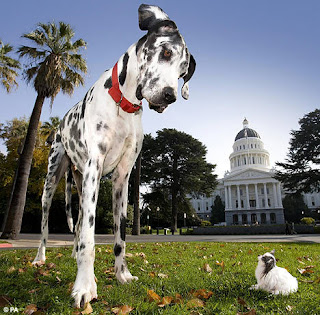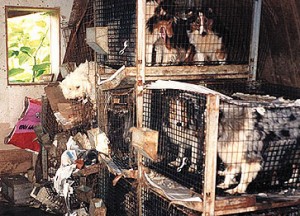They were discussing the potential ban of dogs and cats under 1 year old being sold in retail stores. As a trainer, I applaud this SO HARD. However, the hosts were not as enthusiastic. One of them (one who I typically agree with 98% of the time) mentioned that if she wants to go by a "cockashepoo labrapoopoo", it's her right. On that front, I guess I agree with her. But, her perception was that this bill is restricting where people can and can't buy puppies, and how dare the Humane Society force people to get dogs from shelters.
WHOA NELLY! What?
Yep. I said that right. Her take on the whole issue was that she would have to get her dog from a shelter instead of from a pet store, at least that's what I walked away with. I tried to find the clip online to make sure i heard it correctly, and even if I misheard it, I'm sure others did as well. The thing that frightens me about this whole thing is, by saying this publicly, how many people are going to get into an uproar because a superstar says "they are going to ban the sale of puppies, and you won't be able to get a pure bred dog."
Dogs like the Saluki have been around since 2000 BC. Breeders have always been around and available, and I have never seen one available in a pet store. Also, "cockashepoo labrapoopoo" would technically be a mixed breed dog, not a pure breed.
The Saluki Breed is WAY older than the cars they are running by.
They'll be just fine without pet stores.
They'll be just fine without pet stores.
Let me make one thing abundantly clear. The ban of puppies in pet stores is not to prevent you (the consumer) from purchasing a pure bred puppy. As long as humans have had dogs, there have been neighborhood dogs knocking up other neighborhood dogs.
"It's not the size of the boat, but the motion of the ocean, if you know what I mean!"
"Yeah, but it takes a long time to get to England in a row boat..."
The shelter groups popped up as a means of providing shelter and find homes for the dogs that can no longer be cared for by their family, those who are found on the street, or that needed help.
On the other hand, people have also been selecting for certain traits in dogs, fine-tuning and honing the domestic dog as a craft. There have always been breeders (or something akin to breeders back in the day). You will still be able to get a pure bred puppy, regardless of if pet stores are in operation.
These bills are not designed to force people to get a shelter dog (though I hope it increases the numbers of people looking to shelters and rescue groups). It is designed to take one of the legs out from the puppy mill industry. There will still be breeders (good and bad breeders!) but at least taking the mass commercialism out of the industry can save thousands of dogs annually from these horrific conditions.
Puppy Mills: What They Are and How They Function
We've all heard the term "puppy mill". Puppy mills are a mass dog breeding facility. The dogs and puppies are generally kept in wire cages with a wire floor so when the animal eliminates, it falls through the floor, often on to the dog in the crate below. The animals are kept in these crates 24 hours a day, eat and drink in these crates, and the females are often bred every heat cycle. There is no veterinary care available for these dogs, and diseases (like kennel cough and parvovirus) and parasites (like giardia) can spread like wildfire. The puppies are weaned well short of the 8-10 week recommended mark, which leaves the puppies under-nourished and set up for behavioral issues going forward.
These puppies do not receive the adequate attention from humans necessary to prime them to be well adjusted members of a human household. They don't have access to treats, toys, or any of the things that we think of for our house pets.When they are handled, they are generally handled by the scruff of the neck instead of carried gently, which later down the road, makes it a challenge to handle many of these dogs in daily life (like grooming, or leashing).
This is where your pet store puppy comes from.
I'm dead serious.
How Puppy Mills Make Money
To a puppy mill, every dog represents a profit. The easiest way to make a profit is to get these dogs into the public, face to face with a potential buyer, and let the cute puppy face do the talking. Puppy mills also get a lot of business through online sales. By banning the sale of puppies in pet shops, one of the legs is taken out from the puppy mill industry, making it harder for these businesses to continue keeping dogs in deplorable conditions.(See my earlier post on seeing a dog before you purchase it).
Most pet shops are fully aware that their puppies come from puppy mills. The sales people on the floor might not know the truth, but the owners of the stores absolutely are aware. Some employees do their best to help these dogs out, and try to protect them, but it's often a futile effort as there are just so many coming in.
When I worked at an animal hospital, I remember a woman coming in with her dog that she got in a pet store. She swore up and down that this puppy had papers, and it came from a good breeder. If she had thought for 2 seconds about that phrase - "it came from a good breeder", and what a good breeder actually does for the puppies they handle, she would have realized the ridiculousness to her statement. No decent breeder would sell their puppies to a pet store to be sold to anyone with enough money, to live in a cage with a wire bottom until it's sold in a mall. That puppy ended up having pneumonia when she got it.
The good breeders that I know generally keep tabs on the owners and puppies that they paired over the years. Some, not all, send Christmas cards. Most will match a puppy to the family, not the other way around, and all do a thorough check of the family in question. Most of these breeders will have a clause in their contract that explicitly states that if things don't work out for any reason, no matter how old the dog is, the dog is to be returned to the breeder and not to a rescue group/shelter. No self-respecting breeder would EVER sell their puppies to be sold willy-nilly to a pet-shop, which will sell to anyone with a credit card.
How Puppy Mill Dogs/Puppies Affect A Purchaser
Regardless of if you buy a pet store puppy because you feel badly for it, or you really want a (*insert breed here*), you have supported the puppy mill industry. If you are purchasing that puppy to save it, the puppy mill breeder does not care. As far as they are concerned, there is an empty crate in a pet store that needs to be filled, and they are ready to fill it.
Health
When I worked at the animal hospital, I can't tell you how many of the puppies sold at the local pet shop came in with kennel cough, eye issues, and pneumonia. Even though they all had a waiver from the pet shop stating "if anything happens to your puppy in 36 hours, we'll cover the vet costs", all too often the pet shop would renege on their promise, leaving the new owner with a hefty vet bill. Once a puppy came in with her 5 year old new "owner", and the parents. The puppy was really sick, and had to be put down within a 24 hour period. I couldn't imagine being the parent that has to tell a kid why their brand new puppy wasn't coming home. The pet store told them that the puppy was healthy when it left the store, and they would not be reimbursed.
It infuriated me how much money people spent in a pet store to satisfy an immediate craving for a new, cute puppy they saw in the window - and would have to turn around and spend several hundred (or more) on health care within a few days of bringing the new dog home to treat disease, illness, parasites, or to even hear terrible news about a hereditary defect that will cost thousands to fix. Spend the $2,000 that you'd spend in a pet store and go to reputable breeder or support a rescue group if you want a pure bred puppy.
Training
Great - you have a puppy! Most people will tell you to get training for your new bundle of four legged joy, but for a puppy mill / pet store puppy, it's a LOT harder. Because these pups weren't properly socialized, many can be fearful of people, snappy at strangers, or shut down in the presence of things that they find scary. A classroom may be too overstimulating for these dogs. You must go slow if your pet store puppy/puppy mill puppy is showing any signs of fear. These dogs have never seen a leash or collar, so something as simple as leashing up Fido to go for a stroll can be an exercise in patience for the new owner.
House training these guys is one of the toughest things you can do. A tool often used for house training is a crate - but these dogs, from birth, have always eliminated in their crate, and had always been covered in fecal matter and urine - so their sense of needing to stay clean in their immediate environment has been desensitized. This will often be another exercise in patience for the owner. Some pups adjust quickly to house training, and others can take months to a year to get totally house trained.
Dominance or abrasive training will absolutely undo all the work you've done to gain the trust of your new puppy. Positive training is the way to go.
Where are the Bans on Pet Store Puppies?
Currently, there are only 5 cities in the USA that ban the sale of puppies in pet stores. They are:
-West Hollywood, CA
- South Lake Tahoe, NV
- Albuquerque, NM
- Austin, TX
- Hermosa Beach, CA
In West Hollywood, there were no pet stores that would have been affected by the ban, but the law is on the books. What the ban did in West Hollywood was get a lot of people talking.
Albuquerque, however, did have pet stores that would have been affected, and the numbers speak for themselves. Albuquerque has seen a 23% rise in animal adoptions, and (stunningly!) a 35% drop in euthanasia. I think by these numbers, it would be hard to continue defending the commercial sale of dogs in a pet store environment.
I really hope that people read up on where their dogs come from. Education will be the key to eventually ending these inhumane practices that place a burden on every facet of the dog industry (shelters, vets, trainers, behaviorists, and owners). It takes a lot of effort to walk by the puppy in the window, but until those cash registers stop Ka-Chinging, the industry will stay alive and well, unlike the dogs in their "care".



Wow you have come a long way from playing a dog on stage to training them. I just happened to find your site while looking up dog training. Im glade your doing well.
ReplyDeleteSteve from LEC
STEVE! No kidding! Zap me an email (muttstuff at gmail dot com) and we can catch up!
ReplyDelete